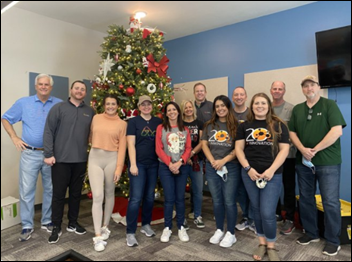Monday Morning Update 1/17/22
Top News

Verana Health, which sells real-world evidence data to life sciences companies, raises $150 million in a Series E funding round, increasing its total to $289 million.
The San Francisco-based company offered a tele-ophthalmology triage app under the name DigiInsight Technologies until 2018, when it signed a deal to commercialize the patient dataset of the American Academy of Ophthalmologists and pivoted into life sciences data.
The company’s real-world data network has 20,000 medical society member providers in ophthalmology, urology, and neurology.
Reader Comments
From Veteran of the Psychic Wars: “Re: HIMSS show dropouts. Will you be reporting them again this year?” I will when I hear about them, which really happened only during HIMSS20, when a company that decided not to attend was noteworthy enough to warrant issuing a press release or tweet. It isn’t in the best interest of HIMSS to announce pullouts, so the only surefire way to track dropouts would be if HIMSS religiously updates their conference exhibitor floor plan, in which case (a) it could be screen-scraped with the “not really exhibiting” vendors who haven’t booked a 10×10 booth or larger could be excluded; and (b) the result could be exported to a database and compared with previous versions. The exhibitor count is at 640, up from 603 a week ago. Let me know if your company had signed up to exhibit but has decided against it. Still, I’ll offer the same advice as I did in 2020 and 2021 – exhibit or not based on your own comfort level, not on what everybody else is doing.
HIStalk Announcements and Requests

About 20% of poll respondents have tested positive for COVID-19 at some point, with about 4% of those requiring hospitalization and the others evenly split between no impact or having some degree of symptoms.
New poll to your right or here: Which social networks are you using much less now than two years ago? I admit that I don’t use most of them and I’m weaning myself off Facebook because I feel worse after looking at it instead of better. I probably waste more time in the rabbit hole of YouTube than the others.
HIMSS isn’t the only conference trying to figure out how to implement safety protocols in Florida. Less than 50 days from its start in Miami Beach, the inaugural ViVE conference — put on by CHIME and HLTH March 6-9 — hasn’t announced COVID protocols, saying only that it hasn’t decided about requiring vaccination and hopes that “masking and social distancing can become personal decisions.” The conference expects 3,500 attendees, 300 sponsors, and 250 speakers.
Webinars
None scheduled soon. Previous webinars are on our YouTube channel. Contact Lorre to present your own.
Acquisitions, Funding, Business, and Stock
Healthcare conversational AI vendor MPulse Mobile acquires healthcare communications vendor HealthCrowd. MPulse Mobile has raised $42 million through a Series C round, including a new investment that makes growth equity firm PSG its majority shareholder.

A federal court orders former drug company CEO Martin Shkreli to repay $65 million and bans him from participating in the drug industry for life for his role at Vyera Pharmaceuticals, formerly known as Turing Pharmaceuticals, which acquired the exclusive rights to old toxoplasmosis treatment drug Daraprim and immediately raised its price by 5,000%. The New York attorney general declared him “a pharma bro no more.” He will complete a seven-year federal prison sentence for securities fraud in November. Shkreli’s swaggering, obnoxious personality and declarations that his actions were simply “capitalism at work” got him in trouble for doing pretty much what all drug companies do in monopolizing markets by buying off would-be competitors or burying them in legal challenges – he should have worn a suit, spoken soaringly about human health while quietly stuffing cash in the mattress, and jacked Daraprim’s price up steadily over a few years like insulin manufacturers have learned to do to prevent an immediate uproar for profiting on the backs of desperately ill people.
Sales
- In England, five NHS trusts in Surrey and Sussex will implement Sectra radiology imaging.
People

Hartford HealthCare names Joel Vengco, MS, MA (Baystate Health) as SVP / chief information and digital officer. He replaces Richard Shirey, who is retiring.

Optimum Healthcare IT Chief Marketing Officer Larry Kaiser takes on additional responsibility in the same role with related company Clearsense.

David McSwain, MD, MPH (MUSC) joins UNC Health as CMIO.

Laboratory information management system vendor Ovation.io hires Curt Medeiros, MBA (Ontrak) as CEO.

Matthew Anderson, MD, MBA (Banner Health) joins HonorHealth Medical Group as CMIO.
Announcements and Implementations

CHIME launches the degree-granting CHIME University for digital health professionals, which will begin classes on January 31 for the 45 credit hour Master of Digital Healthcare and 60 credit hour Doctor of Digital Healthcare degrees. The degrees are self-paced and offered digitally, with a rolling enrollment allowing learners to start at any time. Each degree costs a flat $12,000 with discounts offered to CHIME members, CHIME Foundation members, and CHIME-affiliated organizations. CHIME University, which has not earned accreditation but will seek it, will initially offer its programs to residents of 21 states.
Kaiser Permanente joins member-led, non-profit digital health company Graphite Health, joining SSM, Presbyterian Health Services, and Intermountain Healthcare. The company offers a marketplace for digital health solutions.
Government and Politics
The VA pushes back its second Cerner go-live from March 5 to April 30 at its Columbus, OH facility, which it says has experienced training delays because 200 of its 1,700 employees are absent.
Privacy and Security

File transfer software vendor Accellion reaches an $8 million settlement for a December 2020 breach that affected 9 million people, 3.5 million of them patients with Centene, Kroger, Trinity Health, and others. Hackers sent extortion emails to at least 100 companies, threatening to publish their sensitive data online. The company says in its settlement proposal that it did not guarantee the security of its software, adding that its license agreement disclaims those guarantees and includes a limitation of liability for breach-related damages. New sales of the company’s 20-year-old File Transfer Appliance software ended in 2016, but customers were allowed to renew their licenses even though the software’s final security update was in February 2019. The company now markets its products under the name Kiteworks.
Other
NPR covers the month-old ransomware downtime of Kronos Private Cloud, which has affected 8 million employees, including those of many health systems. AHA says that hospitals have been hit especially hard with the manual payroll work that is required as they deal with heavy COVID-19 workload. AHA says that hackers are obviously to blame, but it is disappointed with Kronos for a lack of transparency and its failure to protect its systems. The company said Friday that it has restored access for 1,000 customers, putting it ahead of schedule for its target of a complete recovery by January 28. Kronos also says that “a relatively small volume of data” was exfiltrated by the hacker in the December 11 attack and it has notified affected customers.
Sponsor Updates
- InterSystems publishes a report, “The High Cost of Bad Data and Analytics on Strategic Healthcare Decisions.”
- Wolters Kluwer Health and Laerdal Medical release the next generation of VSim for Nursing, which provides real-world, evidence-based training scenarios for nursing students.
- OptimizeRx names Ash Roozbehani (Delta Dental) as senior counsel.
- PatientBond joins Olive’s marketplace, The Library.
- Premier’s Contigo Health business expands its provider-sponsored health plan offerings through a new partnership with OhioHealthy.
- Talkdesk is recognized by TrustRadius with 2022 Best of Awards for Feature Set, Value, and Relationship in the Contact Center category.
Blog Posts
- 4 healthcare leaders envision the healthcare ecosystem of the future (Olive)
- What community health looks like in 2022 (PatientBond)
- Back-to-Basics: HIPAA-compliant Texting (Symplr)
- Bad Data, Evolving Payer Requirements, and Staffing Challenges: Overcoming Roadblocks in 2022 (RCxRules)
- RTPB: A Surprise and Delight in the EHR (RxRevu)
- How to be smart with integrations (Sonifi Health)
- One secret to the success of pagers. (The answer might surprise you.) (Spok)
- What providers need to elevate patient experience (Talkdesk)
- Simplifying Communication, Protecting Staff During COVID-19 (Vocera)
- How to Make Benefit Verification Less Painful (WebPT)
- Timely Referral Scheduling is Key to Positive Patient Outcomes (Well Health)
- Beyond Software and Content: Zynx Informaticists Enhance Effective Clinical Decision Support (Zynx Health)
Contacts
Mr. H, Lorre, Jenn, Dr. Jayne.
Get HIStalk updates.
Send news or rumors.
Contact us.








































































































 We’ve been a Cerner customer on the acute EHR side for quite a while and have further implemented both ambulatory and rev cycle. On the acute side, we’ve been generally pleased with the product, services, and support. However, we saw Cerner challenges with the ambulatory and rev cycle implementations. From my viewpoint, Cerner’s biggest problems today are:
We’ve been a Cerner customer on the acute EHR side for quite a while and have further implemented both ambulatory and rev cycle. On the acute side, we’ve been generally pleased with the product, services, and support. However, we saw Cerner challenges with the ambulatory and rev cycle implementations. From my viewpoint, Cerner’s biggest problems today are:























































Today's post contains the phoenixes rising from the ashes of the post COVID telehealth era. There's two things that destroy…